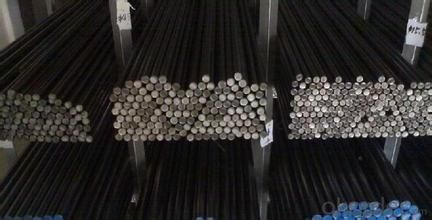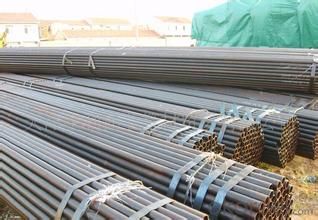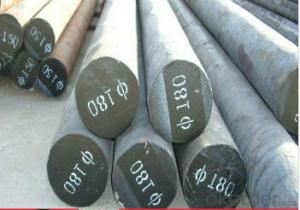Spring Steel Round Bars Grade 55cr3
- Loading Port:
- China Main Port
- Payment Terms:
- TT or LC
- Min Order Qty:
- -
- Supply Capability:
- -
OKorder Service Pledge
OKorder Financial Service
You Might Also Like
Product Basic Information:
Material | ASTM SAE 5155 | ||
Chemical Composition | Mechanical Properties(In Quenched & Tempered State) | ||
C | 0.52-0.60 | Tensile strength(MPA) | 1078 |
Si | 0.17-0.37 | Yield strength (MPA) | 1225 |
Mn | 0.65-0.95 | Elongation(δ5/%) | 9 |
Cr | 0.65-0.95 | Reduction in Area (ψ/%) | 20 |
Mo | - | Impact (J) | - |
P | ≤0.035 |
Hardness |
- |
S | ≤0..035 | ||
Cu | 0.25 | ||
Ni | 0.35 | ||
Product Sales Information:
Material | bearing Steel round bar |
Size | Diameter:20mm-1000mm Length:500mm-6000mm |
Origin place | Made In China |
Delivery Condition | Hot rolled,cold drawn,forged |
Surface require | Black,grinding,bright,polish |
Heat treatment | Quenched,Tempered,annealed |
Packing | seaworthy packing ,wooden case ,carton,woven bag or at client's requires |
Delivery time | In 10-50 days |
Trade Term | EXW,FOB,CIF |
Payments | T/T or L/C at sight |
Port | China main Port,such as shanghai,Dalian,Shenzhen port. |
MOQ | 1 Ton |
FAQ of Spring Steel Round Bars:
①How is the quality of your products?
Our products are manufactured strictly according to national and internaional standard.Guaranteed: If products’ quality don’t accord to discription as we give or the promise before you place order, we promise 100% refund.
②How about price?
Yes, we are factory and be able to give you lowest price below market one, and we have a policy that “ for saving time and absolutely honest business attitude, we quote as lowest as possible for any customer, and discount can be given according to quantity”,if you like bargain and factory price is not low enough as you think, just don’t waste your time.Please trust the quotation we would give you, it is professional one.
③Why should you chose us?
Chose happens because of quality, then price, We can give you both.Additionally, we can also offer professional products inquiry, products knowledge train(for agents), smooth goods delivery, exellent customer solution proposals.Our service formula: good quality+good price+good service=customer’s trust
SGS test is available, customer inspection before shipping is welcome, third party inspection is no problem.
Any question, pls feel free to contact us !
Spring Steel Round Bars Images


- Q:How does special steel contribute to the strength of structures?
- Special steel contributes to the strength of structures by providing enhanced properties such as high tensile strength, durability, and resistance to corrosion. This type of steel is specifically engineered to withstand heavy loads, extreme conditions, and harsh environments. Its superior strength allows for the construction of structures that can support more weight, withstand greater pressures, and resist deformation. Whether used in buildings, bridges, or machinery, special steel plays a vital role in ensuring the structural integrity and longevity of various constructions.
- Q:How does special steel contribute to the nuclear industry?
- The nuclear industry heavily relies on special steel for multiple reasons. To begin with, this type of steel is exceptionally resistant to corrosion and can endure extreme temperatures and pressures. As a result, it is an ideal material for constructing nuclear reactors and other components, ensuring the safety and longevity of nuclear power plants. Additionally, special steel is used in manufacturing fuel assemblies and storage containers for nuclear fuel. These containers must effectively contain radioactive materials without any leakage or contamination. Special steel possesses the necessary strength and durability to meet these requirements. Furthermore, special steel is crucial in the fabrication of steam generators, which are essential components in nuclear power plants. Steam generators transfer heat from the reactor to the turbines, generating electricity. Given the high temperature and pressure conditions inside steam generators, it is essential to use a material that can withstand these harsh circumstances. Special steel fulfills this requirement. Moreover, special steel is employed in the production of control rods. These rods play a vital role in regulating the nuclear reaction within the reactor core by being inserted or withdrawn to control the rate of fission and maintain a stable reaction. Special steel's mechanical properties and resistance to radiation damage ensure the reliability and effectiveness of control rods. Additionally, special steel is utilized in constructing shielding materials and containment structures. These structures aim to protect workers, the environment, and the general public from radiation exposure. Due to its excellent radiation shielding properties, special steel is the preferred material for these applications. In conclusion, special steel is essential to the nuclear industry as it provides the necessary strength, durability, and resistance to corrosion, heat, and radiation. It enables the safe and efficient operation of nuclear reactors, facilitates the storage and transportation of nuclear fuel, and safeguards personnel and the environment.
- Q:How does special steel contribute to the renewable energy sector?
- Special steel plays a crucial role in the renewable energy sector by enabling the construction of highly efficient and durable renewable energy infrastructure. It is used in the manufacturing of wind turbine components, solar panels, and hydroelectric power systems, among others. Its exceptional strength, corrosion resistance, and ability to withstand extreme conditions make it ideal for withstanding harsh weather and environmental factors. Additionally, special steel helps optimize energy conversion and transmission, ultimately improving the overall efficiency and reliability of renewable energy systems.
- Q:How does special steel perform in low-temperature applications?
- Special steel performs well in low-temperature applications due to its unique properties such as high strength, toughness, and resistance to brittleness. It retains its mechanical properties even at extremely cold temperatures, making it ideal for industries like aerospace, automotive, and energy where materials need to withstand challenging environments.
- Q:What are the challenges in forging special steel?
- Forging special steel poses several challenges, primarily due to its composition and properties. One challenge is achieving the desired microstructure and alloy distribution throughout the steel during the forging process. Special steels often contain complex alloys, which can be difficult to evenly distribute and maintain during forging. Another challenge is controlling the temperature and heat treatment processes to avoid any detrimental effects on the steel's mechanical properties. Special steels are sensitive to temperature changes, and improper heating or cooling can lead to structural weaknesses or loss of desired properties. Additionally, forging special steels may require specialized equipment and techniques to accommodate their unique characteristics, making the process more intricate and demanding.
- Q:What are the common challenges in welding titanium alloys?
- Welding titanium alloys poses several common challenges, mainly due to the unique properties of titanium. First, titanium has a high melting point, around 1668°C (3034°F), which requires specialized equipment and techniques to achieve optimal welding conditions. This high melting point also increases the risk of overheating and subsequent distortion or warping of the welded parts. Another challenge is the high reactivity of titanium with oxygen, nitrogen, and hydrogen. During the welding process, these gases can easily contaminate the weld pool, leading to the formation of brittle and porous welds. Therefore, stringent measures such as using inert shielding gases like argon or helium, maintaining a high level of cleanliness, and employing proper welding techniques like gas tungsten arc welding (GTAW) are necessary to minimize contamination and achieve sound welds. Titanium also has a strong affinity for carbon, which can result in the formation of brittle intermetallic compounds during welding. To prevent this, it is crucial to use low-carbon filler metals and ensure proper heat input to avoid carbon diffusion into the weld zone. Furthermore, titanium alloys have a low thermal conductivity, which means that heat generated during welding tends to concentrate in a small area, leading to localized overheating and potential damage. Therefore, controlling heat input and employing appropriate welding techniques to distribute heat evenly are crucial to avoid overheating and maintain the integrity of the welded joint. Lastly, titanium alloys exhibit a high thermal expansion coefficient, causing significant thermal expansion and contraction during the welding process. This can result in distortion and residual stresses in the welded parts. To mitigate these issues, preheating and post-weld heat treatment may be necessary to minimize distortion and relieve residual stresses. In summary, the common challenges in welding titanium alloys include high melting point, reactivity with gases, potential contamination, formation of intermetallic compounds, low thermal conductivity, and significant thermal expansion. By understanding these challenges and implementing appropriate welding techniques, it is possible to overcome these difficulties and achieve high-quality welds in titanium alloys.
- Q:How does special steel perform in abrasive wear conditions?
- Special steel is designed specifically to excel in conditions of abrasive wear, thanks to its unique composition and manufacturing process. This makes it highly resistant to the harmful effects of abrasion. The inclusion of alloying elements like chromium, manganese, and molybdenum in special steel significantly boosts its hardness and toughness. These elements aid in the formation of carbides within the steel matrix, which serve as barriers against abrasion. The carbides effectively withstand the forces exerted by abrasive particles, preventing them from inflicting significant damage on the steel surface. Additionally, special steel undergoes specialized heat treatment processes like quenching and tempering, further enhancing its resistance to abrasive wear. These processes not only increase the steel's hardness but also enhance its overall toughness and durability. As a result, special steel can withstand high levels of abrasion without experiencing substantial wear or deterioration. Moreover, special steel exhibits excellent corrosion resistance, in addition to its exceptional mechanical properties. This is achieved by incorporating elements such as chromium, which creates a protective oxide layer on the steel surface. The oxide layer acts as a barrier, preventing corrosive substances from reaching the underlying steel and causing further harm. In conclusion, special steel performs exceptionally well in conditions of abrasive wear. Its distinctive composition, heat treatment processes, and corrosion resistance properties make it an ideal material for applications where abrasion is a major concern. Whether in mining, manufacturing, or other industries prone to abrasive wear, special steel offers superior performance and extended lifespan, ensuring optimal efficiency and cost-effectiveness.
- Q:How does special steel perform in terms of corrosion resistance in acidic environments?
- Special steel, also known as stainless steel, is highly regarded for its exceptional corrosion resistance in various environments, including acidic conditions. It contains a minimum of 10.5% chromium, which forms a protective layer on the surface of the steel known as a passive film. This passive film acts as a barrier, preventing the steel from coming into direct contact with the corrosive elements present in acidic environments. The chromium content in special steel enables it to react with oxygen in the atmosphere, creating a thin and transparent oxide layer. This oxide layer is highly stable and self-healing, making stainless steel highly resistant to corrosion caused by acids. The presence of other alloying elements such as nickel and molybdenum further enhances its resistance to acidic corrosion. In acidic environments, special steel exhibits excellent resistance to both general corrosion and localized corrosion, such as pitting and crevice corrosion. It can withstand a wide range of acid concentrations and temperatures, making it suitable for applications in industries such as chemical processing, pharmaceuticals, and marine environments where exposure to acidic solutions is common. It is important to note that the performance of special steel in acidic environments may vary depending on the specific grade and composition of the steel. Different grades of stainless steel have varying levels of alloying elements, which can influence their corrosion resistance properties. Therefore, it is essential to select the appropriate grade of special steel that matches the specific acidic environment to ensure optimal performance and longevity.
- Q:What are the main applications of special steel in the electronics packaging?
- The main applications of special steel in electronics packaging include providing structural support and protection for electronic components, ensuring electromagnetic compatibility, heat dissipation, and preventing corrosion.
- Q:What are the different methods of preventing stress relaxation in special steel?
- Preventing stress relaxation in special steel can be achieved through various methods. One effective approach is the utilization of heat treatment, specifically by employing the annealing process. Annealing consists of heating the steel to a specific temperature and gradually cooling it down. This technique successfully alleviates internal stresses within the steel, thus preventing stress relaxation. Another effective method involves employing stress relieving techniques. These techniques necessitate the controlled application of stress to the steel, typically through cold working or mechanical deformation. By doing so, the steel can effectively release any accumulated stress and avoid relaxation over time. Furthermore, incorporating alloying elements into the steel can also aid in preventing stress relaxation. Certain alloying elements, such as molybdenum and chromium, enhance the steel's strength and stability, thereby improving its resistance to stress relaxation. Lastly, meticulous design and engineering of components also contribute to the prevention of stress relaxation. Engineers can minimize the risk of stress relaxation in special steel applications by considering factors such as load distribution, material thickness, and stress concentration points. In conclusion, a combination of heat treatment, stress relieving techniques, alloying elements, and thoughtful design can be employed to effectively prevent stress relaxation in special steel.
1. Manufacturer Overview |
|
|---|---|
| Location | |
| Year Established | |
| Annual Output Value | |
| Main Markets | |
| Company Certifications | |
2. Manufacturer Certificates |
|
|---|---|
| a) Certification Name | |
| Range | |
| Reference | |
| Validity Period | |
3. Manufacturer Capability |
|
|---|---|
| a)Trade Capacity | |
| Nearest Port | |
| Export Percentage | |
| No.of Employees in Trade Department | |
| Language Spoken: | |
| b)Factory Information | |
| Factory Size: | |
| No. of Production Lines | |
| Contract Manufacturing | |
| Product Price Range | |
Send your message to us
Spring Steel Round Bars Grade 55cr3
- Loading Port:
- China Main Port
- Payment Terms:
- TT or LC
- Min Order Qty:
- -
- Supply Capability:
- -
OKorder Service Pledge
OKorder Financial Service
Similar products
New products
Hot products
Related keywords






























